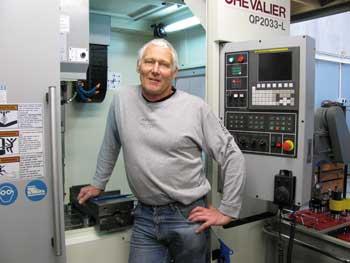| ALAN Reid’s toolmaking career began in the late 1960s and he has been involved in a number of slightly weird but always wonderful projects over the years. His company A B Reid Toolmaking is based in Glenfield, on Auckland’s North Shore, and has been synonymous with press tools, plastic injection moulds and aluminium die-cast dies in that time. But lately the company has specialised in zinc pressure die-cast moulds and brass and aluminium forging dies. “I also design all of the dies we make and can help customers with product design and the manufacture of prototypes, through to full production of parts,” says Reid. Recently A B Reid Toolmaking made the decision to ‘up the ante’ with a brand new CNC machine – a vote of confidence in the future of the industry as the country starts to claw its way out of the recession. So why the new machine? “My old machine began to give me too many problems, so I was faced with the choice of an upgrade or closing down,” says Reid. “Of all the machines I looked at the Chevalier QP2033-L suited my purpose the best. It’s a good basic high-speed machine with large travels in the XY and Z axes for its footprint size, and David Thumath from CNC Direct has been great to deal with. “The machine has 10,000rpm and 11kW at the spindle, rapids at 30Mpm and feeds at about 10Mpm. The tool change carousel holds 24 tools. We believe we’ll be able to turn the work around quicker and get better and more accurate finishes on mould surfaces,” he says. Reid is looking forward to the opportunities this new technology will lead him too. He has never been shy to tackle the more challenging projects. “There are many projects I have been involved with over the years, including working with Diecasting NZ and Fisher & Paykel on fridge and oven parts, in the days when they made everything locally. I have also helped bring bronze and aluminium forging dies into the modern age with Technical Forgings; they are a fantastic company to deal with. “Recently I helped design and model an RFID tag and injecting syringe for local company Ensid Technologies. This product is used to inject fish and other animals with a tiny RFID computer chip encased in plastic, so researchers can monitor habits and stocks of various species. I designed and made the first prototype plastic tag mould myself but the production moulds for the tag and syringe were made in China. This project has huge potential worldwide.” But perhaps Reid’s most interesting project has been the making of rocket motor parts for friend Phil Vukovich, a member of the Amateur Rocketry Association, and the man behind a rocket that reached 27,486 feet – a New Zealand altitude record. Vukovich’s next goal is to reach 40,000 feet with a two-stage rocket. |
“Phil designs and builds the rocket and gives me the information needed to make the motors. I then make the aluminium casings, rocket nozzles, front end closures, and a few jigs and things he needs to manufacture the fuel with. The fuel is sugar mixed with fertilizer and melted together on a hot plate in a pot,” explains Reid. “It is then poured into moulds approximately five inches in diameter by maybe eight inches long. It has a large hole right through the middle. The reason Phil uses this particular fuel is that it is quite stable and safe to handle. The blocks are stacked one on top of the other, then the top one is lit first with an igniter.
Contact: abreid@element.net.nz |






